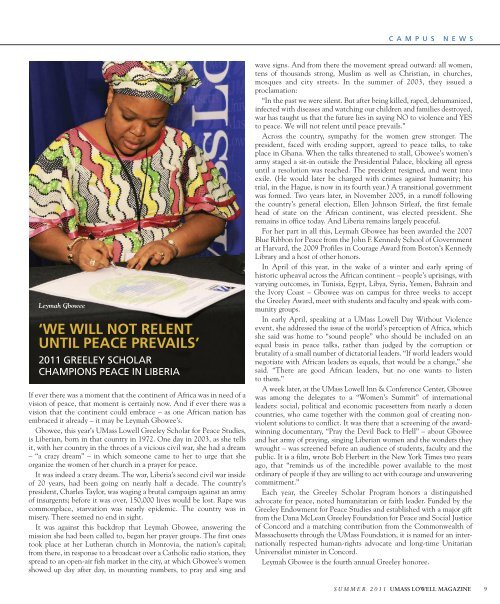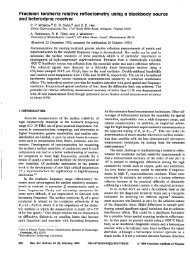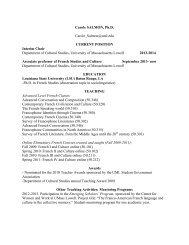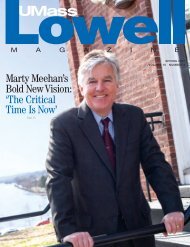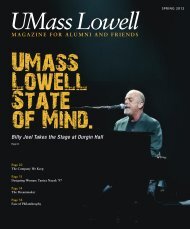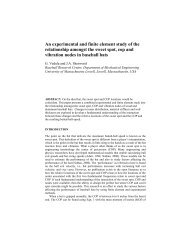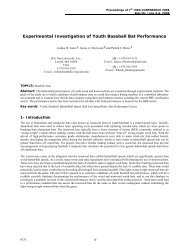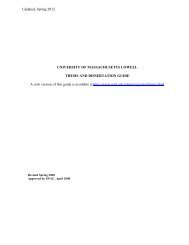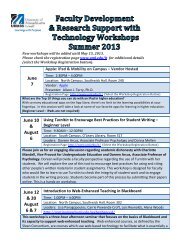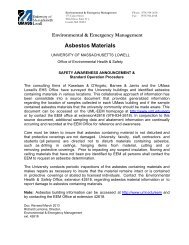Summer 2011 - University of Massachusetts Lowell
Summer 2011 - University of Massachusetts Lowell
Summer 2011 - University of Massachusetts Lowell
You also want an ePaper? Increase the reach of your titles
YUMPU automatically turns print PDFs into web optimized ePapers that Google loves.
C A M P U S N E W S<br />
Leymah Gbowee<br />
‘WE WILL NOT RELENT<br />
UNTIL PEACE PREVAILS’<br />
<strong>2011</strong> GREELEY SCHOLAR<br />
CHAMPIONS PEACE IN LIBERIA<br />
If ever there was a moment that the continent <strong>of</strong> Africa was in need <strong>of</strong> a<br />
vision <strong>of</strong> peace, that moment is certainly now. And if ever there was a<br />
vision that the continent could embrace – as one African nation has<br />
embraced it already – it may be Leymah Gbowee’s.<br />
Gbowee, this year’s UMass <strong>Lowell</strong> Greeley Scholar for Peace Studies,<br />
is Liberian, born in that country in 1972. One day in 2003, as she tells<br />
it, with her country in the throes <strong>of</strong> a vicious civil war, she had a dream<br />
– “a crazy dream” – in which someone came to her to urge that she<br />
organize the women <strong>of</strong> her church in a prayer for peace.<br />
It was indeed a crazy dream. The war, Liberia’s second civil war inside<br />
<strong>of</strong> 20 years, had been going on nearly half a decade. The country’s<br />
president, Charles Taylor, was waging a brutal campaign against an army<br />
<strong>of</strong> insurgents; before it was over, 150,000 lives would be lost. Rape was<br />
commonplace, starvation was nearly epidemic. The country was in<br />
misery. There seemed no end in sight.<br />
It was against this backdrop that Leymah Gbowee, answering the<br />
mission she had been called to, began her prayer groups. The first ones<br />
took place at her Lutheran church in Monrovia, the nation’s capital;<br />
from there, in response to a broadcast over a Catholic radio station, they<br />
spread to an open-air fish market in the city, at which Gbowee’s women<br />
showed up day after day, in mounting numbers, to pray and sing and<br />
wave signs. And from there the movement spread outward: all women,<br />
tens <strong>of</strong> thousands strong, Muslim as well as Christian, in churches,<br />
mosques and city streets. In the summer <strong>of</strong> 2003, they issued a<br />
proclamation:<br />
“In the past we were silent. But after being killed, raped, dehumanized,<br />
infected with diseases and watching our children and families destroyed,<br />
war has taught us that the future lies in saying NO to violence and YES<br />
to peace. We will not relent until peace prevails.”<br />
Across the country, sympathy for the women grew stronger. The<br />
president, faced with eroding support, agreed to peace talks, to take<br />
place in Ghana. When the talks threatened to stall, Gbowee’s women’s<br />
army staged a sit-in outside the Presidential Palace, blocking all egress<br />
until a resolution was reached. The president resigned, and went into<br />
exile. (He would later be charged with crimes against humanity; his<br />
trial, in the Hague, is now in its fourth year.) A transitional government<br />
was formed. Two years later, in November 2005, in a run<strong>of</strong>f following<br />
the country’s general election, Ellen Johnson Sirleaf, the first female<br />
head <strong>of</strong> state on the African continent, was elected president. She<br />
remains in <strong>of</strong>fice today. And Liberia remains largely peaceful.<br />
For her part in all this, Leymah Gbowee has been awarded the 2007<br />
Blue Ribbon for Peace from the John F. Kennedy School <strong>of</strong> Government<br />
at Harvard, the 2009 Pr<strong>of</strong>iles in Courage Award from Boston’s Kennedy<br />
Library and a host <strong>of</strong> other honors.<br />
In April <strong>of</strong> this year, in the wake <strong>of</strong> a winter and early spring <strong>of</strong><br />
historic upheaval across the African continent – people’s uprisings, with<br />
varying outcomes, in Tunisia, Egypt, Libya, Syria, Yemen, Bahrain and<br />
the Ivory Coast – Gbowee was on campus for three weeks to accept<br />
the Greeley Award, meet with students and faculty and speak with community<br />
groups.<br />
In early April, speaking at a UMass <strong>Lowell</strong> Day Without Violence<br />
event, she addressed the issue <strong>of</strong> the world’s perception <strong>of</strong> Africa, which<br />
she said was home to “sound people” who should be included on an<br />
equal basis in peace talks, rather than judged by the corruption or<br />
brutality <strong>of</strong> a small number <strong>of</strong> dictatorial leaders. “If world leaders would<br />
negotiate with African leaders as equals, that would be a change,” she<br />
said. “There are good African leaders, but no one wants to listen<br />
to them.”<br />
A week later, at the UMass <strong>Lowell</strong> Inn & Conference Center, Gbowee<br />
was among the delegates to a “Women’s Summit” <strong>of</strong> international<br />
leaders: social, political and economic pacesetters from nearly a dozen<br />
countries, who came together with the common goal <strong>of</strong> creating nonviolent<br />
solutions to conflict. It was there that a screening <strong>of</strong> the awardwinning<br />
documentary, “Pray the Devil Back to Hell” – about Gbowee<br />
and her army <strong>of</strong> praying, singing Liberian women and the wonders they<br />
wrought – was screened before an audience <strong>of</strong> students, faculty and the<br />
public. It is a film, wrote Bob Herbert in the New York Times two years<br />
ago, that “reminds us <strong>of</strong> the incredible power available to the most<br />
ordinary <strong>of</strong> people if they are willing to act with courage and unwavering<br />
commitment.”<br />
Each year, the Greeley Scholar Program honors a distinguished<br />
advocate for peace, noted humanitarian or faith leader. Funded by the<br />
Greeley Endowment for Peace Studies and established with a major gift<br />
from the Dana McLean Greeley Foundation for Peace and Social Justice<br />
<strong>of</strong> Concord and a matching contribution from the Commonwealth <strong>of</strong><br />
<strong>Massachusetts</strong> through the UMass Foundation, it is named for an internationally<br />
respected human-rights advocate and long-time Unitarian<br />
Universalist minister in Concord.<br />
Leymah Gbowee is the fourth annual Greeley honoree.<br />
S U M M E R 2 0 1 1 UMASS LOWELL MAGAZINE 9


